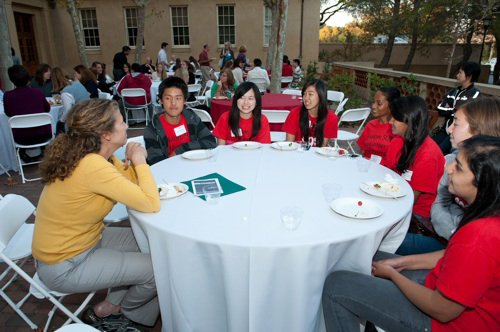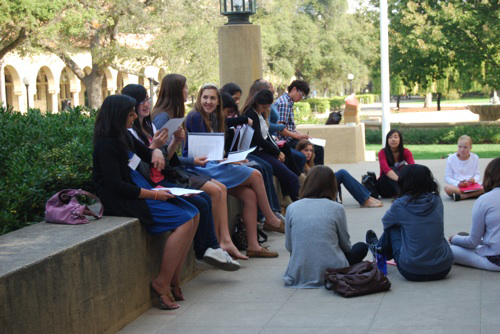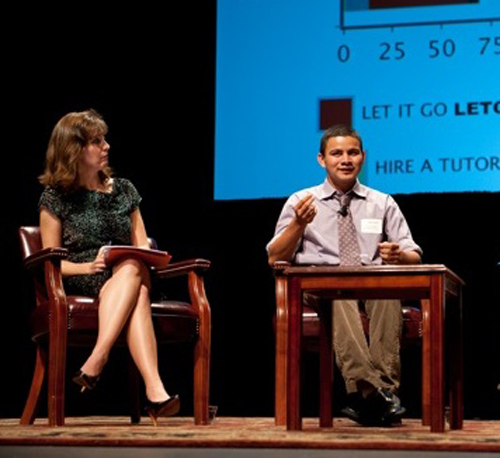
The College Board has long claimed its gold standard AP Program can help students succeed in college, کامیابی کے فرق کو کم کریں اور روایتی طور پر کم خدمت والے ہائی اسکولوں اور طلباء کے لیے کھیل کے میدان کو برابر کریں۔. The program has had its share of controversy since its inception in 1955 and subsequent substantial growth, particularly in the last two decades. Some have argued that it is over-valued, emphasizing memorization over deep mastery of content, and that it also puts a strain on high schools, والدین اور طلباء.
On October 29, 2012, the faculty of Dartmouth voted to modify its Advanced Placement (AP) پالیسی. Dartmouth stated that while AP exam scores would continue to be a valuable tool for evaluating applicants, beginning with the class of 2018, AP exam scores would no longer qualify for credit to be granted toward graduation. As noted by Michael Mastanduno, Dean of the Faculty of Arts and Sciences, the change is “rooted in our faculty’s belief that high AP exam scores are not a substitute for a Dartmouth undergraduate class.”
What does the research show? Is there value to the Advanced Placement Program or does it do more harm than good? Challenge Success at the Stanford Graduate School of Education reviewed over 20 research studies on the Advanced Placement Program as well as examined its own research on the subject with schools and students. I connected with Challenge Success Co-Founder Denise Pope to discuss the findings.

What finding from your research into the AP program surprised you the most?
We work with many schools where students suffer from high stress levels often caused by pressure to succeed academically, so we were surprised to learn from our own empirical work that the number of AP or honors courses does not necessarily correspond to the level of stress a student feels. مثال کے طور پر, we have students in our study who are taking one AP or honors course, and they may indicate feeling as much stress as students who are taking 3-4 AP or honors courses. So we didn’t find a “magic number” of AP courses that corresponded with optimal health; it really depends on the individual student, the homework load that s/he can handle given the other courses and extracurricular activities each semester, and what makes sense in terms of challenge levels and individual interests. We do know that AP courses often come with much more homework, so students need to be prepared for the extra work and make sure this fits with their overall schedule and their ability to take care of their health and well-being.
What do you see as the benefits and negatives of the AP Program in terms of helping to narrow the achievement gap? Are schools with the program better than those without?
We found solid research that shows that certain reform initiatives (مثلا, the National Math and Science Initiative) use AP courses in conjunction with other reform efforts such as teacher professional development, student tutoring, clear goals and metrics, improvements in middle school curricula, وغیرہ, to improve the quality of education and help to narrow the achievement gap. تاہم, in other cases, when AP courses are introduced without the necessary attention to student and teacher preparation, we found little evidence to indicate that the program contributes to student academic success. Some schools with the AP program in place are better than those without, but you certainly don’t need to offer AP courses to be a quality school. We know many schools that don’t offer AP courses but offer an excellent education for their students.

How would you rank this relative to other programs taking cost and resources in consideration?
Each school needs to consider the possible costs and benefits of hosting an AP program. When implemented thoughtfully with the necessary support for teachers and students mentioned above, several students may benefit, but there may also be opportunity costs associated with the program: non-AP students may be in larger classes with less experienced teachers; and we sometimes find de facto tracking of students, as the most capable students are siphoned off into AP courses that dictate the rest of their schedules. Schools may want to put more time and resources toward professional development for all teachers to improve differentiation of instruction and revise curricula for all students — not just the advanced students — without the limitations that come with an AP program.
Does taking AP classes boost a student’s chances of college admissions?
Many colleges consider AP enrollment and test scores in their admission processes; تاہم, the ways that colleges use this information vary greatly. Some colleges like to see that students have taken AP courses when these classes are offered at their high schools; some give extra points to student GPA’s when they take AP courses; some give credit for passing scores on the AP exams, while others do not. Researchers caution colleges not to put too much emphasis on AP when considering applicants, since research is inconclusive on whether AP experience alone impacts student achievement in college. This can also become an equity issue since students from small, دیہی, or low-income schools tend to have less access to AP classes.
How do you see the benefits of AP classes in the eventual college academic experience?
Research is clear that students who take AP courses often do better in college. The question is whether or not these same motivated and high-achieving students would have done just as well in college without taking AP courses in high school. It is very difficult to establish causation here. We did find some rigorous studies that showed that students who took AP courses in certain math and science subjects did better in those courses in college than students who did not take the AP in those subject areas. تاہم, often students who take the AP exam, even in the sciences, may benefit more from taking the course again at the college level.

As a significant part of the AP Program is a standardized test does the program teach the higher level skills that require nurturing in regular high school courses, or is it also prey to teaching to the test?
The College Board recognized a few years ago that some of their courses were too narrow and were emphasizing memorization over deep mastery of content, and they are currently in the process of revamping several of their exams. AP Biology was one of the first to be changed this year to focus more on scientific inquiry and skill-building. AP US History will be revised next year, but many teachers remain frustrated with the “mile-high, inch deep” approach that some of the AP courses demand in order to prepare students for the culminating exams.
What are your recommendations for educators (اور طالب علموں کو) to make the AP program better serve the learning goals that US students need to attain to keep up with the best foreign school systems?
We urge schools and families to educate themselves about the pros and cons of the AP program and to take a hard look at AP policies and practices. Here are a few suggestions for students:
Don’t take AP courses just to get into college. While many elite colleges will expect applicants to have enrolled in rigorous and challenging courses, AP enrollment alone will not guarantee your college admission. اس کے علاوہ, taking AP courses and doing poorly because you are taking them for the wrong reasons or are in over your head will not reflect well upon you, nor will taking AP courses that cause undue stress, limit your ability to participate in other meaningful activities, or impact your ability to get enough sleep. It’s best to enroll in AP courses only in areas that are of real interest to you and in which you are prepared and able to work hard.
Do your homework ahead of time. Know that not all AP courses are the same, even within the same subject. In spite of the common curriculum, courses vary between schools and between teachers. Gather as much information from teachers and alumni as possible so that you have realistic expectations about the course content, expectations, معیار, and workload.
And a few suggestions for Educators:
If you are considering implementing an AP program in your school, consider the level of readiness and preparation of all involved. Do students and teachers have the background and support necessary to succeed? Are students in an AP program likely to thrive without the program being too big of a drain on the non-AP students? Think carefully about whether it might be a better allocation of resources to invest in improving all existing classes and working with teachers to differentiate instruction for all learners.
Invite students (and their parents) interested in AP courses to attend an AP information session that provides an overview of your school’s program. Teachers from each department should be available to answer questions and provide information including course syllabi, sample assignments, and any expectations for summer work.
Don’t confuse AP rigor with load. We have seen several successful teachers who can curb the homework load in their AP courses without sacrificing test scores. Students may benefit more from fewer assignments and a focus on deep understanding of concepts learned in class.

All Photos are Courtesy of Challenge Success, سٹینفورڈ یونیورسٹی.
For more information visit www.challengesuccess.org
تعلیم کے لئے عالمی تلاش میں, سر مائیکل باربر سمیت میرے ساتھ اور عالمی سطح پر معروف فکری رہنماؤں (برطانیہ), ڈاکٹر. مائیکل بلاک (امریکہ), ڈاکٹر. لیون Botstein (امریکہ), پروفیسر مٹی Christensen کے (امریکہ), ڈاکٹر. لنڈا ڈارلنگ-ہیمنڈ (امریکہ), ڈاکٹر. مادھو چوہان (بھارت), پروفیسر مائیکل Fullan (کینیڈا), پروفیسر ہاورڈ گارڈنر (امریکہ), پروفیسر اینڈی Hargreaves نے (امریکہ), پروفیسر کریں Yvonne ہلمین (نیدرلینڈ), پروفیسر کرسٹن Helstad (ناروے), جین Hendrickson نے (امریکہ), پروفیسر گلاب Hipkins (نیوزی لینڈ), پروفیسر Cornelia Hoogland (کینیڈا), فاضل جیف جانسن (کینیڈا), مسز. چینٹل کوفمین (بیلجیم), ڈاکٹر. Eija Kauppinen (فن لینڈ), سٹیٹ سیکرٹری Tapio Kosunen (فن لینڈ), پروفیسر ڈومینک Lafontaine (بیلجیم), پروفیسر ہیو Lauder (برطانیہ), پروفیسر بین لیون (کینیڈا), رب کین میکڈونلڈ (برطانیہ), پروفیسر بیری McGaw (آسٹریلیا), شیو ندار (بھارت), پروفیسر R. نٹراجن (بھارت), ڈاکٹر. PAK NG (سنگاپور), ڈاکٹر. ڈینس پوپ (امریکہ), شریدر رازگوپالن (بھارت), ڈاکٹر. ڈیانے Ravitch (امریکہ), رچرڈ ولسن ریلی (امریکہ), سر کین رابنسن (برطانیہ), پروفیسر Pasi Sahlberg (فن لینڈ), Andreas کی Schleicher (پیسا, او ای سی ڈی), ڈاکٹر. انتھونی Seldon نے (برطانیہ), ڈاکٹر. ڈیوڈ Shaffer کے (امریکہ), ڈاکٹر. کرسٹن عمیق کر رہے ہیں (ناروے), چانسلر اسٹیفن Spahn (امریکہ), ایوز Theze (اسکول Français کی امریکہ), پروفیسر چارلس Ungerleider (کینیڈا), پروفیسر ٹونی ویگنر (امریکہ), سر ڈیوڈ واٹسن (برطانیہ), پروفیسر Dylan کے Wiliam (برطانیہ), ڈاکٹر. مارک Wormald (برطانیہ), پروفیسر تیو Wubbels (نیدرلینڈ), پروفیسر مائیکل نوجوان (برطانیہ), اور پروفیسر Minxuan جانگ (چین) وہ تمام اقوام کو آج سامنا ہے کہ بڑی تصویر تعلیم سوالات دریافت کے طور پر. تعلیم کمیونٹی پیج کے لئے گلوبل تلاش
C. M. روبن وہ ایک موصول ہوئی ہے جس کے لئے دو بڑے پیمانے پر پڑھا سیریز کے مصنف ہے 2011 میں Upton سنکلیئر ایوارڈ, “تعلیم کے لئے گلوبل تلاش” اور “کس طرح پڑھیں گے?” انہوں نے تین bestselling کتابوں کے مصنف ہیں, سمیت Wonderland میں یلس اصلی.






حالیہ تبصرے